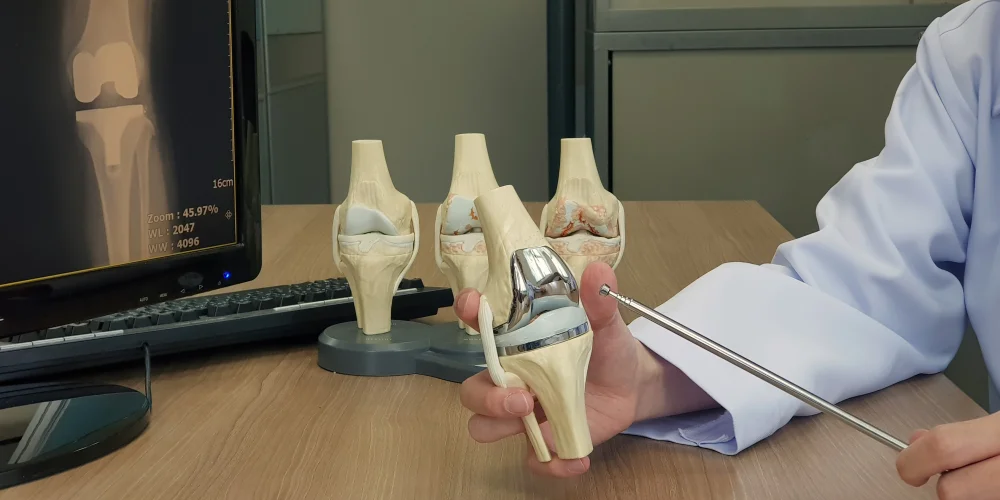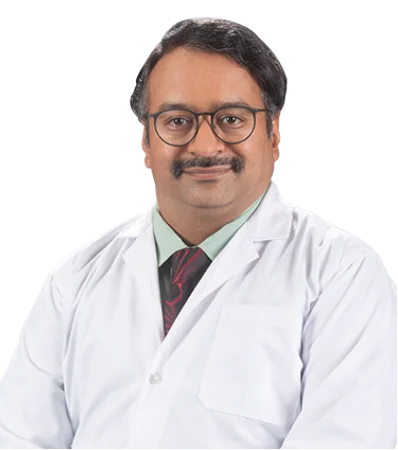Total Joint Replacement Surgery
Effective Treatment for Joint Pain and Dysfunction
At Chirayu Super Speciality Hospital, total joint replacement surgery is an extraordinary procedure designed to relieve pain and restore function in severely damaged joints. Our expert orthopedic surgeons use cutting-edge technologies and techniques for performing precise joint replacement surgeries that bring lasting relief and enhance your quality of life through our comprehensive, personalized approach to joint replacement.

What Is Total Joint Replacement Surgery?
Total joint replacement surgery refers to the removal and replacement of damaged or arthritic joints with artificial replacement joints known as prostheses – generally performed on hip, knee or shoulder joints to alleviate pain, improve function and increase mobility. Care is taken when selecting and fitting these artificial joints so they match up seamlessly with natural movements of their counterparts in the original joint.
Who Performs Your Surgery
Our total joint replacement surgeries are conducted by highly experienced orthopedic surgeons specializing in joint reconstruction. Our team utilizes cutting-edge technologies and techniques for effective outcomes while putting a strong focus on patient-centric care, working closely with you to create a tailored treatment plan and provide exceptional care throughout the surgical process.
Types of Total Joint Replacement Surgery
- Total Hip Replacement : Replacement of the hip joint with a prosthetic implant to relieve pain and restore hip function.
- Total Knee Replacement : Removal of the damaged knee joint and replacement with an artificial joint to improve knee function and alleviate pain.
- Total Shoulder Replacement : Replacement of the shoulder joint with a prosthesis to address severe shoulder pain and restore range of motion.
- Partial Joint Replacement : Replacement of only the damaged part of the joint, preserving healthy bone and tissue.
Symptoms Indicating the Need for Joint Replacement
Common signs that indicate total joint replacement include persistent joint pain that interferes with daily activities, reduced range of motion, stiffness and difficulty walking or performing daily tasks. When conservative treatments such as medication and physical therapy no longer prove effective, surgery may become an option.
Diagnosis for Total Joint Replacement Surgery
Proper diagnosis requires a comprehensive assessment including medical history review, physical examination and imaging studies such as X-rays or MRI scans to help establish joint damage severity and inform decisions about surgery need. These assessments aid in making better informed decisions on this important decision-making process.
Treatment Process
The treatment process starts with a comprehensive pre-surgical evaluation to assess your overall health and suitability for joint replacement surgery. Once under anesthesia, damaged joints will be carefully extracted from their sockets before prosthetic ones are carefully implanted – post surgery you will then undergo a structured rehabilitation program designed to facilitate recovery, improve mobility and restore function.
Care and Recovery Following Surgery
Recovery after total joint replacement surgery typically includes an overnight hospital stay for initial healing and pain management, followed by rehabilitation at our center. We create personalized care plans utilizing physical therapy exercises as part of physical rehabilitation plans to facilitate a smooth healing experience and restore joint function, with regular follow-up appointments being scheduled to monitor progress and ensure optimal outcomes.
Advantages of Choosing Our Surgery Services
Orthopedic Surgeons
Specialized in total hip, knee, and shoulder replacements using the latest techniques.
Personalized Implants
Custom-fit joint implants to ensure maximum comfort, mobility, and longevity.
Comprehensive Rehabilitation
Tailored rehabilitation programs to speed up recovery and restore full function.
What Our Patients Say
Read about our patients positive experiences and how Chirayu Super Speciality Hospital has positively impacted their health and well-being.


The expert care and support provided during my joint replacement surgery were outstanding. I’m recovering well and enjoying improved mobility.


Recovery from my joint replacement surgery was smooth, thanks to the excellent care and support from the Chirayu team.


The results of my joint replacement surgery were excellent. I’m very satisfied with the care provided by the Chirayu Hospital team


Total joint replacement at Chirayu Hospital transformed my life. The pain is gone, and my mobility has greatly improved.
Meet Our Medical Specialists
Our orthopedic surgeons specialize in total joint replacement, offering advanced techniques and personalized care to restore function and alleviate pain.
Frequently Asked Questions
Here, we provide answers to some of the most commonly asked questions to help you better understand about our surgery services. If you have any additional questions, please do not hesitate to contact us.
Risks may include infection, blood clots, implant failure, and complications related to anesthesia. Your surgeon will discuss these risks with you.
The duration of the surgery varies but generally lasts between 1 to 3 hours, depending on the joint being replaced and the complexity of the procedure.
Preparation involves a pre-surgical evaluation, imaging studies, and discussing the procedure, recovery, and rehabilitation with your medical team.
Commonly replaced joints include the hip, knee, and shoulder. Partial joint replacements are also performed for specific cases.
Symptoms include persistent joint pain, reduced range of motion, joint stiffness, and difficulty performing daily activities.



